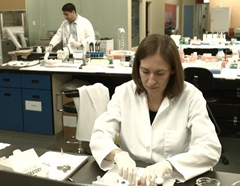
Dating is tough. The bar scene is not for everyone, and connecting online can feel like a shot in the dark. And even if your first date sizzles, it can be difficult to keep the momentum going.
But now a company founded by two U of T grads is attempting to inject some science into the search for a soulmate, using DNA testing to help couples get together – and stay together.
Sara Seabrooke (BSc 2005 UTSC, PhD 2010) and Ron Gonzalez (BSc 2004 UTSC, MSc 2007 UTM, MBA 2013) launched Instant Chemistry three years ago on the premise that our genes influence how we behave in relationships. Couples who pay $129 or the company’s kit each provide a saliva sample for testing. They also complete an online psychological assessment. A few weeks later, Instant Chemistry sends back the DNA test results, along with a 27-page report that provides a kind of customized relationship road map, outlining areas where they can expect smooth sailing or a bumpy ride, as well as a score out of 100 for how compatible they are together.

Seabrooke and Gonzalez, themselves a couple, were the first to take the test – and scored 80 per cent – on the high end of average for people in a long-term relationship, says Gonzalez. “It’s very rare that a couple scores 100 per cent, or as low as 40 per cent,” he notes.
As Gonzalez explains, there are no specific human genes for “relationship compatibility.” Instead, the company looks at genes that may be related to biological and psychological attraction. For example, there are three genes involved with the immune system – the human leukocyte antigen complex – that Gonzalez says may be linked to our sense of attraction through smell and taste. Studies show that people who are dissimilar with respect to these three genes are more likely to be attracted each other. “This mechanism allows us to literally sniff out potential high-quality matches,” says Gonzalez.
The company also looks at genes related to neurotransmitters in the brain, to learn more about an individual’s personality traits known to affect relationship success. One gene related to a serotonin transporter is involved with how we respond to stress. People with a “short” version of the gene tend to have a more extreme response – usually they’re upbeat, but under stress they adopt a more negative attitude, Gonzalez says. People with the “long” version tend to be steadier. A study has shown that couples where each person has the short version of the gene tend to report lower marital satisfaction and a higher divorce rate than other couples. The company also examines genes related to risk-taking, anxiety and empathy.
The science is inexact and not entirely predictive, which is why the psychological survey is also important, says Gonzalez – because it measures other factors crucial to success in a relationship, such as submissiveness, dominance and extroversion.
Initially, Instant Chemistry worked primarily with high-end matchmakers. (The cost of the DNA test is still too high for dating sites or apps such as Tinder, Gonzalez says.) But matchmaking is a small market, so the company started working with established couples, with the goal of helping them improve their relationships. It recently published The Love Manual: Making and Keeping a Connection, which it also sells from its website.
So far, the company targets only straight couples (because the scientific studies backing the company’s analysis have all used straight couples), but Gonzalez says they’re interested in working with lesbian and gay couples on a pro bono basis to learn whether the science also applies to them. – Scott Anderson
Recent Posts
U of T’s 197th Birthday Quiz
Test your knowledge of all things U of T in honour of the university’s 197th anniversary on March 15!
Are Cold Plunges Good for You?
Research suggests they are, in three ways
Work Has Changed. So Have the Qualities of Good Leadership
Rapid shifts in everything from technology to employee expectations are pressuring leaders to constantly adapt





